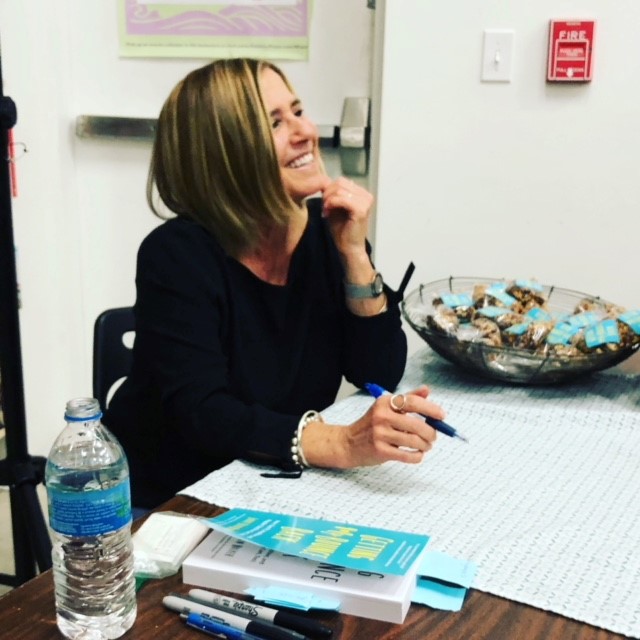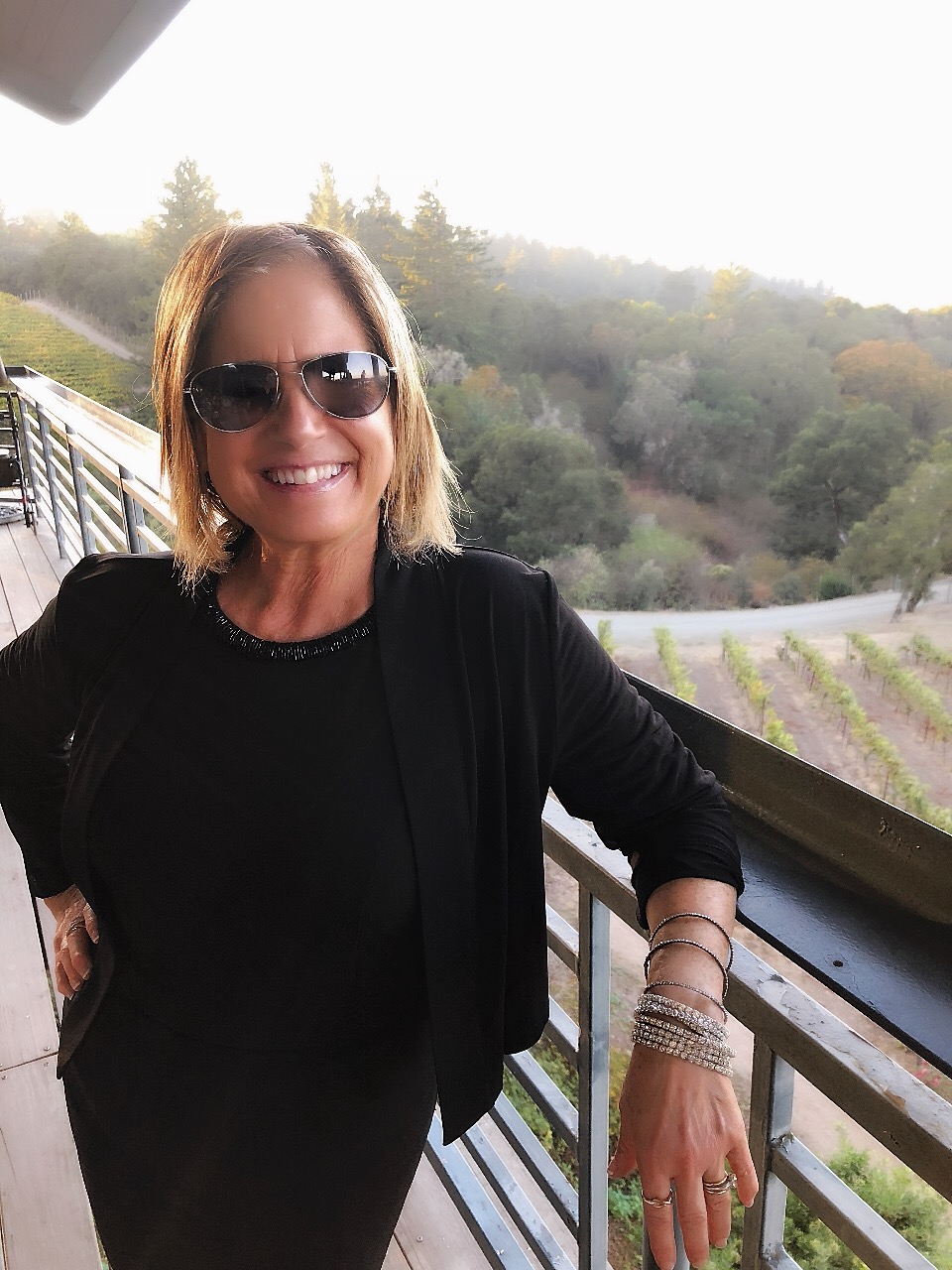I was having lunch at a restaurant in Princeton and talking about my sense of accomplishment after figuring out how to watch TV on my laptop when a young woman sitting at the table next to me turned her head and said, “Are you talking about Younger?”
That was Tessa Albertson, a student at Princeton. She played the role of Caitlin, Liza’s daughter, while she was in high school.
I had just heard about the show and watched a few episodes from the first season. It’s about a single mom in her 40s who pretends to be 26 in order to land a publishing job. Sutton Foster plays Liza, the mom – tall, slim, and with long dark hair.
It’s a silly, fun, well-acted show, but the irony of trying to watch it on my computer, on demand, was not lost on me.
I’m not 26. Or 40. It’s 2018, and I’m 60.
Tessa was sitting with her mom and her grandparents and as we talked about Younger, we inevitably got to the topic of aging.
“Look at my mom,” Tessa said. “Doesn’t she look amazing?
She did.
“And my grandparents? They’re incredible too!”
They were.
Which led to an animated conversation across our two tables about yoga and running and walking and swimming and how much we count on our exercise regimen to keep us feeling good. I was with my son, two years out of Princeton, who, like Tessa, is abundantly fit.
I’ve been coloring my hair for years, first dark brown and now blonde, and if I were late for work and had to choose between moisturizing my skin or walking the dog, I’d feel sorry for the dog. Here’s what I talk about with my friend Neile Miller, a former White House appointee, when we meet for a drink on a Saturday afternoon in Washington, D.C.
Exfoliation.
Because, yes, at our age, turning over cells, whether our skin cells or our bone cells, matters. A lot.
Neile also colors her hair. We use the same hairdresser, and we talk about him, too. Yet in all of our conversations about hair, skin, fashion, exercise, travels, sex, books, it’s never occurred to either one of us to pretend to be younger.
Yet here’s what I’ve noticed now that I’m 60. When people know I’m older, either by guessing my age or by looking at my driver’s license or my medical chart, they treat me as if I am old.
An old woman.
Like a piece of glass. I went to see a respected orthopedist a few years ago for a back issue, and he advised me that I should take it easy.
You’ve raised your family and you’ve been working for years, he said, why push yourself? It’s time to sit down and relax. If you drop something on the floor, he smiled at me, let your husband pick it up when he gets home.
How ridiculous.
And how dangerous.
While my wrinkles may be a road map of my life experiences they’re also a result of dry and less elastic skin brought on by decreasing hormones. Using moisturizers to erase the lines on my face or on my shoulders makes my skin feel less tight, less itchy. Am I hoping they’ll make me look younger?
It wouldn’t matter even if they did if I took that doctor’s advice and thought I had earned the right not to exercise. The only thing that comes from taking it easy day after day as I age is soreness. And not the good kind, the kind I felt as a kid after a long bike ride or an aggressive game of dodge ball.
It’s not about finding products that make me look younger, or whether coloring my hair is a form of anti-aging.
It’s about aging.
After all, the opposite of aging, is, well, the opposite.
Everyone jokes about not exercising, so I get that. But the thing is, like our sleep and what we eat, especially as we age, exercise is not optional.
If we don’t do it well and we’re lucky to have years ahead of us, we might find ourselves too exhausted or too full of regret to do or, even better, enjoy the slightest activity we wouldn’t think two seconds about doing in our 20s. Like standing for hours to get into an awesome museum exhibition or taking public transportation to watch a baseball game.
I’ve heard Hillary Clinton say when President Obama would call her to check in during the 2016 election and ask her “Are you getting enough sleep? How’s your diet? Are you exercising?” Clinton would answer, “I’m getting enough sleep and I’ve got a healthy diet.”
I wouldn’t be too hard on Hillary. Everyone jokes about not exercising, so I get that. But the thing is, like our sleep and what we eat, especially as we age, exercise is not optional.
Our hormone levels drop so gradually after our childbearing years that by the time we’re 60 if we haven’t cultivated a meaningful exercise habit, and many of us haven’t, the consequences of not being fit pile up like dirty laundry. Less estrogen means we’re at risk of losing bone and muscle mass, and with less muscle, our metabolism slows down and we pick up weight even if our diet hasn’t changed.
And then we’ve got more weight pressing down on our fragile bones and weaker muscles, making it uncomfortable and sometimes impossible to continue doing the simplest things we’d always loved to do. We’re exhausted, easily annoyed, and often exasperated, yet somehow we can’t get any sleep.
The crabby old woman.
It was my 26-year-old trainer who stared me down in my mid-50s as he told me it’s not about losing weight or how you look. It’s about being fit, he said. About how you feel. I looked like crap but that was probably because I felt even worse.
The health benefits of regular, vigorous exercise – from heart health to bone health to mental health – are so widely known that new studies proving this or high-tech discoveries making it easier to do that barely grab our attention. I was at a holiday party a few years ago and as I was circulating I realized I was having conversations with cancer survivors, including one amputee. Then I remembered the host had been diagnosed with cancer earlier that year. These were women she had invited from her Fitness for Survivors exercise class. And the teacher, also a survivor, was there, too. At some point in every conversation we circled back to how crucial exercise was to their recovery but also how being fit made it possible to withstand painful treatments and to somehow feel good and enjoy life despite it all.
I don’t remember whether any of these women colored their hair or used make up or even whether they were in their 40s or their 60s. What stuck with me from the encounter was how they wanted to age and not merely grow old in the face of serious medical challenges. If you already engage in meaningful exercise you know how often there are moments that are uncomfortable, but what you learn along the way, is that they are just moments. Not forever.
For years, I was that woman who’d say, “I know what I need to do, but I just don’t do it.” Ladies, we have no clue.
Like many pre-Title IX women, I played on sports teams in high school but there weren’t any coaches who taught me about fitness or what it means to find my edge. Everything was about ordering uniforms. Today’s young women, many of them growing up as Girls on the Run, may still be finding their way in the world, but they’ve got their shit together in the gym.
Any kind of meaningful exercise can be a two-hour commitment from start to finish, including warming up, stretching afterward, showering, drying our hair, etc. That’s a lot of me-time five or six days a week, especially for many women, and it doesn’t matter if we’re empty-nesters or working fewer hours. We’re not used to focusing on ourselves for that length of time, day after day, and we’re reluctant to seek support and ask for help even though we don’t know enough about exercise science to work around our issues.
For years, I was that woman who’d say, “I know what I need to do, but I just don’t do it.” Ladies, we have no clue.
In contrast, many men our age have always had an exercise routine. When my children were young and my husband asked me if I wanted to join him at the gym, I’d throw him a look like, excuse me, what?
Coloring my hair is a habit, a routine, I did not have any trouble getting years ago when I was busying myself with anything other than exercise. But now when I think about whether I’m being honest with myself and coloring my hair or exfoliating my skin to look younger, I realize what I’m after is that feeling I had when I was young. That feeling Liza has both in the workplace and in her social life when she passes for 26.
That feeling of feeling good.
At every age.


